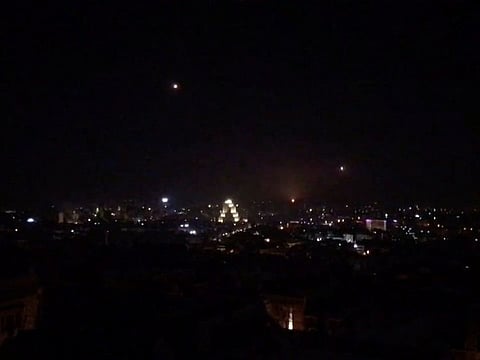Israelis strike Iranian targets in Syria
Strikes target Iranian Revolutionary Guards’ Quds Force killing 11

Israel's military said it carried out strikes on Iranian targets in Syria early Monday after it intercepted a rocket fired from Syrian territory hours before.
It said in a statement it was "currently striking" the Iranian Revolutionary Guards' Quds Force in Syria and warned Syria's military against "attempting to harm Israeli territory or forces".
The Quds Force is in charge of Iran's Revolutionary Guards' overseas operations.
Syrian military air defences destroyed more than 30 cruise missiles and guided bombs during Israeli air strikes on Sunday, Russia's defence control centre was quoted by Interfax news agency as saying.
Israeli air strikes targeting an airport in southeastern Damascus killed four Syrian soldiers and wounded six, the military centre was quoted by RIA news agency as saying on Monday.
Israel's military said on Sunday its air defence systems intercepted a rocket fired from Syria, after Damascus accused Israel of carrying out air raids in the country's south.
The Syrian Observatory for Human Rights war monitor reported Israeli missile strikes in the area of the Damascus airport and areas around the capital.
Witnesses in Damascus said loud explosions rang out in the night sky for nearly an hour.
Israel's military said its aerial bombardment targeted "Iranian Quds military sites in Syria", including munition storage sites and a site located in the Damascus International Airport, along with an Iranian intelligence site and an Iranian military training camp.
Israel has pledged to stop its main enemy Iran from entrenching itself militarily in neighbouring Syria.
It has carried out hundreds of air strikes there against what it says are Iranian military targets and advanced arms deliveries to Tehran-backed Hezbollah.
Israel rarely publicly confirms its strikes in Syria.
Its fighter planes have faced anti-aircraft fire during such raids, but Israeli media reported that Sunday's response included a surface-to-surface missile from Syria.
Israel's military said only that it had intercepted a rocket fired at the northern Golan Heights.
'Permanent policy'
On Sunday, SANA quoted a military source saying Syria's air defences went into action after Israel earlier in the day launched air strikes on the south of the country.
The Russian army said Syrian air defences destroyed seven Israeli projectiles, after four of the Jewish state's F-16 military planes "fired rockets into Syrian territory".
Israeli Prime Minister Benjamin Netanyahu told reporters on Sunday that "we have a permanent policy: to strike at the Iranian entrenchment in Syria and hurt whoever tries to hurt us."
Netanyahu and other Israeli officials have been speaking more openly about the Syria strikes in recent days, with some analysts saying the premier seems to want to further burnish his security credentials ahead of April 9 elections.
But Israel also risks an escalation with Syria and Iran, as well as possibly further angering Russia.
Military coordination between Israel and Russia took a hit after a friendly fire incident in September that led to a Russian plane being downed by Syrian air defences during an Israeli strike.
The incident angered Russia and complicated Israel's operations in Syria, particularly after Moscow's delivery of the advanced S-300 air defence system there in response.
Israel has sought to keep its coordination with Russia on track and maintain its ability to strike in Syria.
On Thursday, Israeli military officials concluded a series of talks with their Russian counterparts aimed at improving coordination in the war-torn country.
Both Russia and Iran are backing Syrian President Bashar al-Assad's regime in his country's civil war.



